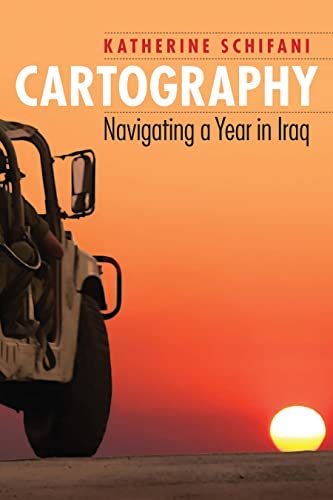Cartography: Navigating a Year in Iraq
Katherine Schifani
Potomac Books, June 2022
The year is 2011, the United States is in the final stages of its two-year withdrawal from Iraq, and Katherine Schifani has been deployed with the US army as the head logistics advisor for the Iraqi Counter Terrorism Service and Special Operations Forces. She is on a yearlong stint in a place where intense heat is always present, triple digits are the norm. As a reader, I felt as if I was on a dangerously overheated planet, both physically and mentally. In her Kafkaesque journey, a stunning portrait unfolds of the evil, violence, and sheer inanity of war. There is no metaphoric map for her work in a place defined by the absence of logic. She is many times the lone cartographer, making decisions which require her to forgo the markers and “ignore normal responses” she has “developed elsewhere in life.”
As a twenty-five-year-old gay woman thrust into a role for which she has received little preparation, Schifani is suddenly immersed in an upended world. On her third day, she stands by a broken-down gun truck in a country full of “bad bridges, broken walls and bleeding American hands.”
There is ongoing tension as to what could happen next in this Looking Glass world. Schifani is assigned a series of interpreters whose understanding of their roles are often misaligned with her own. Her first interpreter gives her gifts: an elaborate tea set, shackles, handcuffs with no key, a lighter with Saddam Hussein on it and bootlegged porn movies. In the absence of any cookware, she eats food with the Iraqis that has been cooked on trashcan lids. As the year unfolds, Schifani has to expand her definition of normalcy in an increasingly bizarre and unpredictable universe.
In this culturally misogynistic environment—of both the US military and their Iraqi partners—she maintains a stoic, measured presence despite the increasing stress of maintaining a persona which is entirely inconsistent with her true self. In one scene, at an Iraqi general’s home, there is an enormous table displaying maps of the country marking travel routes and known targets. At the center of all these maps is a large poster of a woman, legs spread wide, wearing nothing but shoes and a bandolier over “obviously augmented breasts.”
But Schifani is unintimidated. At an Iraqi barber shop, she volunteers to get her hair cut, selecting from choices of photos of male model styles. She picks one and is given a style described by her colleague as “mid-90’s butch lesbian.” Her willingness to get the cut scores her points, as do her soccer skills. The Iraqis are huge soccer fans. Every game with the Americans has been a complete shutout until she scores a goal one night. With a score of seventeen to one, she is hailed as a hero.
At another moment, the Iraqis are building a viewing platform for what she describes as a one-time “show of force performed for the benefit of US and Iraqi generals.” One of their commanders has decreed that the cook’s house must be razed to get maximum viewing space.
She rescues the house after the commander challenges her, saying Hazan, the cook, may keep the house if Schifani can empty an entire magazine of blanks from a brand-new M4 rifle. She successfully fires all thirty rounds in the direction of the stage, and the house is saved.
In the unforgettable chapter titled, “The Omars,” Schifani is presented with three men, each named Omar, and asked which one she would like for a husband. She is finally able to quash the idea of an arranged marriage by saying her father could not meet any of them, therefore such a marriage is not possible. This seems to satisfy the Iraqis. The men then put together a “husband kit” for her: a beautiful dress, turquoise heels, a Versace scarf, fishnet stockings, and Arabic spices. The sheer hilarity of this scene, as I imagine her keeping a solemn face through this ludicrous exercise, is a marked contrast from a time soon after where she and her interpreter are in a room with Ahmed, an Iraqi brigade director of logistics. The power goes out and Ahmed aims his cocked gun up and down her body for what seems an eternity, apparently a perverse act of intimidation. The lights come on and Schifani and her interpreter are summarily dismissed.
Cartography is a well-chosen title; Schifani tries to navigate her way through a world where there are no rules and too many rules. Where she could walk into a room and be surrounded by every nature of weapon, including a minigun which fires three thousands rounds a minute and is called “the breath of Allah.”
This is a remarkable story about war, its terrible consequences for so many, and the lack of consequences for others who take maximum advantage of the chaos. Schifani writes of a world of “sweetly fermented despair.” She leaves us with a lyric from a traditional Arabic song: “Bring back yesterday and stop tomorrow from coming; enough dreaming my friend, this world has an end.”
Gretchen Ayoub
Gretchen is a longtime educator. She is currently at Massachusetts College of Art and Design, where she coaches students on school/life balance, time management and self-advocacy skills. She is at work on a collection of personal essays.
